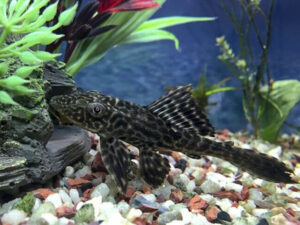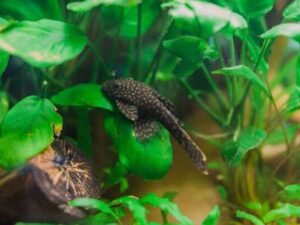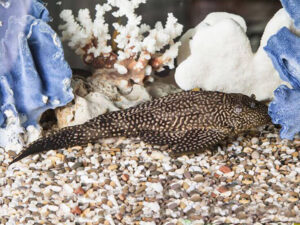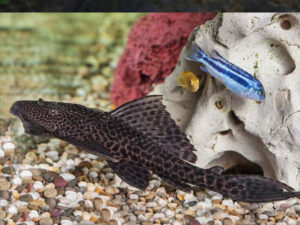The Plecostomus fish is super popular due to it’s scavenging hunger. It does great in fish aquariums! Mainly an algae eater but the Plecostomus will also feed on meaty foods. They are sometimes called the ‘garbage disposal’ due to the wide variety foods and clean up process they due on the bottom of fish aquariums. Most catfish are going to need dark hiding spots. Small tunnels or caves work tremendously well. The fish just needs to hide because they are nocturnal and get insecure without hiding spots.
These fish get the nickname ‘garbage disposals’ for a reason.. BECAUSE they eat literally everything. They are omnivores and that means they also need some protein from time to time. Feed them some regular fish food from time to time. They are nocturnal so do it at night so the other fish don’t eat all of them.
Plecostomus Tank Mates
The first thing to bear in mind is that this fish is nocturnal.
As a youngster this fish is fairly peaceful and can be kept in a community tank. Some ideal tank mates include:
- Cichlids
- Tetras
- Gouramies
- And other common community fish
Even as juveniles you should avoid placing it with Discus and Angelfish as they are known to nip at them. Bear in mind the usual rule; any smaller tank mates shouldn’t be able to fit in the Plecos mouth; if it can it won’t be long until its tank mate turns into dinner.
Don?t Forget About Them!
It’s super easy to forget that bottom feeder is just sleeping somewhere in your tank. I personally go weeks without seeing some of my catfish because they hide all day and only come out at night time.
What to know about feeding aquarium fish
In nature, fish eat whenever they are hungry and the food is available. If food sources are plentiful, they will eat several times a day. On the other hand, if food sources are scarce, they might go for days between meals. For this reason, fish are very opportunistic and will eat whenever they have a chance.
Regardless of one or two feedings, the key is to keep each feeding very small. Do Not overfeed your fish. Whenever in doubt, the best practice is to underfeed your fish. There are a lot of health concerns related to overfeeding your fish.









 Kenya
Kenya

Reviews
There are no reviews yet.